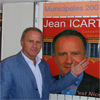Nice-Première: With eleven months to go before the municipal elections, what is your state of mind?
Jean Icart: I am committed to my campaign, and it’s solely for Nice. I have the necessary experience—both as an entrepreneur, having been a business owner for 25 years, where I managed up to 1,500 employees, and in politics, as a county councilor, as well as being the son and grandson of elected officials from Nice.
Nice-Première: Do you believe your experience in the private sector is essential to become mayor?
Jean Icart: Absolutely. Being the mayor of Nice means primarily being a full-time manager. The role requires someone with experience in running a business, accustomed to daily investment and accountability. When we look at Rudy Salles, apart from his secretary, whom has he led in his life? It’s not serious when you intend to manage a city of 600,000 inhabitants.
Nice-Première: You are aligned with the right but without a designated party. Isn’t running without a political label too disadvantageous?
Jean Icart: Let me remind you of a bit of history. In 1995, Jacques Chirac achieved his best presidential score in the Alpes-Maritimes. In the subsequent municipal elections, Jean-Paul Barety, with RPR’s support, was swept aside by Jacques Peyrat, a candidate without any party affiliation. The people of Nice choose their mayor based on competence, not political affiliation. Additionally, I was reelected without a label in the 2001 local elections (as county councilor), whereas Rudy Salles (UDF) lost in the local elections three times. If I have no political label, it’s simply because “my label is Nice.” I will present a list featuring various personalities from civil society, such as oncologist François Demard and the attorney Jacques Randon. It will be a list that transcends political divides.
Nice-Première: Isn’t there a risk that your candidacy, as well as those of Rudy Salles, Jérôme Rivière, Jacques Peyrat himself, and possibly Gilbert Stellardo, will benefit the left?
Jean Icart: I believe Rudy Salles will withdraw before the election. Jérôme Rivière lacks the experience necessary to become mayor. He is well-suited for his role as a deputy (1st district of Alpes-Maritimes), but he would not make a good mayor. As for Gilbert Stellardo, he claims to be a candidate before each municipal election but never runs. That leaves Jacques Peyrat, who behaves like a candidate.
“I listen to the residents, quite the opposite of the mayor.”
Nice-Première: What arguments do you intend to use against Jacques Peyrat?
Jean Icart: I am running solely for the public interest of the city. My career was built in my business; politics is only to express my ideas and because I care about the people of Nice. I listen to the residents, quite the opposite of the mayor. These are two different approaches. With Jacques Peyrat, there can be no opposition; whereas I never say no to a project if I don’t have alternatives.
Nice-Première: And what about the left? Who do you consider the most formidable opponent?
Jean Icart: Patrick Allemand (vice president of the region and county councilor of Nice) seems to be the best placed at the PS. But I am not really concerned about that.
Nice-Première: Recently, you defended Jean-François Knecht (municipal and county councilor PS), who was threatened in the grand stadium affair. Why?
Jean Icart: I found the “trial” conducted against him scandalous. It’s always easier to attack Knecht than Mr. (emphasizes) the Prefect (Pierre Breuil). What happened shocked and outraged me. In this incident, Jacques Peyrat wanted to appear as the victim, while his project was poorly managed from the start.
Nice-Première: What is your perspective on this matter? Do you believe the construction of the grand stadium is imperative?
Jean Icart: What I know is that the Ray stadium is outdated. It is unthinkable to undertake this project at the current Ray location. It would require demolishing the adjacent tennis courts and school. So yes, I am in favor of the grand stadium, but I only have doubts about the need for 32,000 seats when I see current attendance.
Nice-Première: If elected mayor next October, what would be your primary projects?
Jean Icart: There are several. First, for twelve years, I have been fighting to return the port of Nice to fishermen and pleasure boaters, to make it the most beautiful on the Côte-d’Azur. For that, a new commercial port needs to be built at the Var estuary (indicating his project on a map attached to his headquarters wall). Next, the problem of urban traffic congestion needs to be solved. I propose a surface metro line along the existing railway, linking the West to the East of the conurbation, equipped with park-and-ride facilities at each station. Quite the opposite of what was done with the North-South tram line, where the daily flows are much lower. This is the only rational alternative to cars.
Nice-Première: Do you consider the future tram line to be a mistake?
Jean Icart: Certainly, for several reasons. Firstly, because spending a billion euros on the tramway seems excessive to me. Had reserved bus lanes been implemented, the problem would already be solved. Additionally, this line connects the mountains to the sea. Wouldn’t it have been more sensible to connect residential areas and business zones where traffic is congested? Finally, this project did not sufficiently consider the hardships of the shopkeepers. The compensation perimeter was not extensive enough. When I see that “le tombeau de la vaisselle,” a Nice institution, is struggling, I am truly saddened. I fought for the indemnification of the shopkeepers. As a former entrepreneur, I was outraged, because I know very well that business owners face deadlines every month. For Peyrat, it’s only every six years.
Nice-Première: One last question. Before the municipal elections, there are the presidential elections. Will you call for a vote for someone?
Jean Icart: I have my personal convictions, but I will make no call. I’ve gotten used to never asking for votes from anyone.


